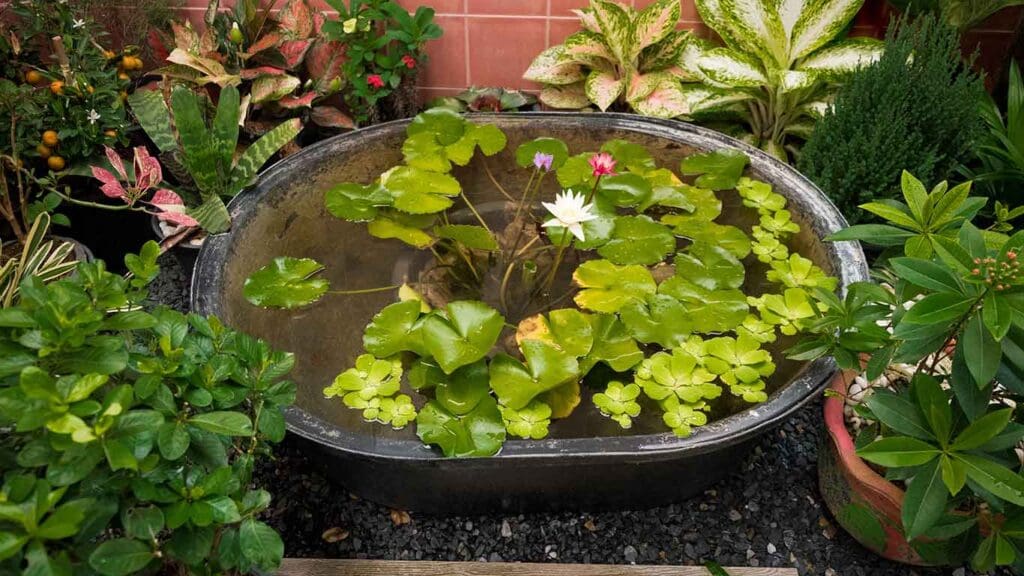If you’re considering building a koi pond, one of the most important decisions you’ll need to make is determining the appropriate size for your pond. ‘How Many Koi Can You Keep in a 100 Gallon Pond?’ is a common question that arises when planning a small koi pond. While it may seem like a straightforward question, there are several factors to consider before determining the number of koi fish that can thrive in a 100-gallon pond.
Understanding the requirements of koi fish is crucial to determining the appropriate size for your pond. Koi fish are known for their vibrant colors and graceful movements, but they also have specific needs to thrive. Koi fish require adequate space, clean water, and proper nutrition to grow and thrive. A small pond may be suitable for a few juvenile koi, but as they grow, their size and waste production increase, which can quickly overwhelm a small pond. In this article, we’ll explore the factors that determine the number of koi fish that can comfortably live in a 100-gallon pond and how to maintain a healthy koi pond.
How Many Koi Can You Keep in a 100 Gallon Pond- Core Insights:
Understanding Koi Ponds
If you are considering starting a koi pond, it is important to understand the basics of koi pond design and care. Koi fish are beautiful and fascinating creatures, but they require specific conditions to thrive.
One of the most important factors to consider is the size of your pond. As a rule of thumb, you should aim for at least 250 gallons of water per koi fish. This means that a 100-gallon pond is only suitable for a very small number of koi, if any at all.
In addition to size, there are other important factors to consider when designing your koi pond. These include filtration, aeration, and water quality. Koi fish produce a lot of waste, so it is important to have a high-quality filtration system to keep the water clean and healthy.
Aeration is also important because koi fish require oxygen to survive. Aeration systems can help to maintain oxygen levels in the water and prevent the buildup of harmful gases.
Finally, water quality is crucial for the health and well-being of your koi fish. You should regularly test the water for pH, ammonia, nitrite, and nitrate levels, and make adjustments as necessary to maintain a healthy environment for your fish.
Overall, creating a successful koi pond requires careful planning and attention to detail. By understanding the basic principles of koi pond design and care, you can create a beautiful and healthy environment for your koi fish to thrive.
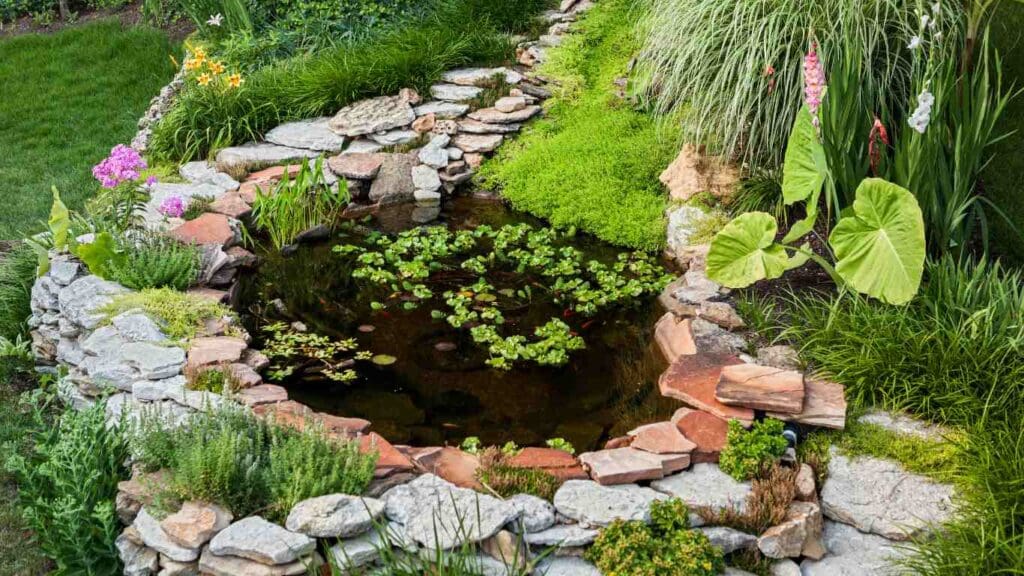

Determining Pond Size
When it comes to koi ponds, size matters. The size of your pond will determine how many koi you can keep without overcrowding them. Overcrowding can lead to health problems and even death for your fish. So, how do you determine the right size for your pond?
First, consider the number of koi you want to keep. As a general rule, you should have no more than one koi per 250 gallons of water. So, for a 100-gallon pond, you should only have one small koi. If you want more than one koi, you will need to increase the size of your pond accordingly.
Next, think about the size of your koi. Koi can grow quite large, with some reaching over two feet in length. You will need to make sure your pond is large enough to accommodate their size, as well as provide enough space for them to swim and thrive.
In addition to the size of your koi, you should also consider the overall environment of your pond. Factors like filtration, aeration, and water quality can all impact the health and well-being of your fish. A larger pond can provide a more stable environment, with better water circulation and filtration.
Ultimately, the size of your pond will depend on your specific circumstances and needs. Consider the number and size of your koi, as well as the overall environment of your pond, to determine the right size for your needs. Remember, a larger pond may require more maintenance and upkeep, but it can also provide a healthier and happier home for your koi.
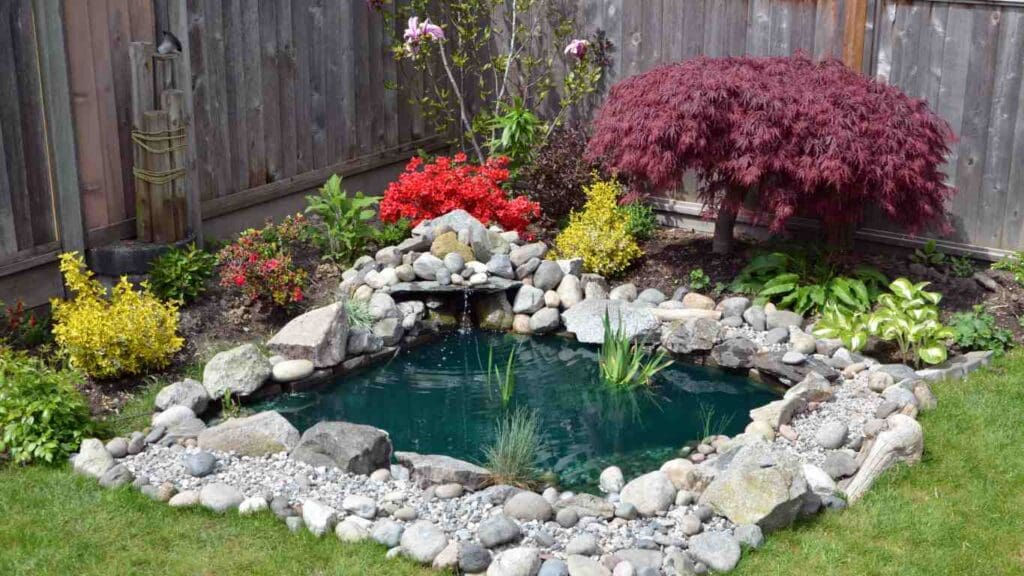

Koi Fish Requirements
If you have a 100-gallon pond and want to keep koi fish, it’s important to understand their requirements. Koi fish are beautiful, but they require specific conditions to thrive. Here are some things to keep in mind:
- Water Volume: As a general guideline, it’s recommended to have at least 250 gallons of water per adult koi fish. So, for a 100-gallon pond, it would be best to keep no more than one juvenile koi fish until they outgrow the space or consider upgrading to a larger pond.
- Water Quality: Koi fish require clean, well-oxygenated water. They produce a lot of waste, so it’s important to have a good filtration system in place. You should also test the water regularly and make sure the pH, ammonia, nitrite, and nitrate levels are within the appropriate range.
- Temperature: Koi fish are cold-water fish and prefer temperatures between 65-75°F. If the water temperature gets too high, it can cause stress and illness in the fish. You may need to use a pond heater or chiller to maintain the appropriate temperature.
- Feeding: Koi fish are omnivores and require a balanced diet. You can feed them a combination of pellets, vegetables, and live foods. It’s important not to overfeed them, as this can lead to health problems and poor water quality.
- Space: Koi fish are active swimmers and require plenty of space to move around. In a 100-gallon pond, you should provide plenty of hiding places and areas for the fish to rest.
Overall, keeping koi fish in a 100-gallon pond can be challenging, but it is possible with proper care and attention. However, it’s important to keep in mind that as the fish grow, they will require more space. If you are serious about keeping koi fish, you may want to consider upgrading to a larger pond in the future.


Get Advice from a Koi Pond Expert – Join our KPE Community!
Calculating Koi Fish Capacity
If you are planning to keep koi fish in your 100-gallon pond, it is important to know how many koi you can safely keep without overcrowding the pond. Overcrowding can lead to stress, poor water quality, and increased susceptibility to diseases. As a general guideline, it’s recommended to have at least 250 gallons of water per adult koi fish.
Using this guideline, you can calculate the maximum number of koi fish you can keep in your 100-gallon pond. As a 100-gallon pond can hold up to 100 gallons of water, it would be best to keep no more than one juvenile koi fish until they outgrow the space or consider adding other species of fish that can thrive in smaller volumes of water.
Refer to the table below for a general guideline on the number of koi fish you can keep based on the size of your pond:
| Pond Size | Number of Koi Fish |
|---|---|
| 50 gallons | 0-1 |
| 100 gallons | 0-1 |
| 200 gallons | 1-2 |
| 300 gallons | 2-3 |
| 500 gallons | 4-5 |
| 1000 gallons | 8-10 |
Remember that this is just a guide, and the number of koi fish you can keep in your pond depends on various factors such as the size of your koi fish, filtration capacity, and water quality. It is important to monitor the water quality regularly and perform water changes as needed to maintain a healthy living environment for your koi fish.
In summary, when calculating koi fish capacity in a 100-gallon pond, it is recommended to keep no more than one juvenile koi fish until they outgrow the space or consider adding other species of fish that can thrive in smaller volumes of water. Always refer to the guidelines and monitor the water quality regularly to maintain a healthy living environment for your koi fish.
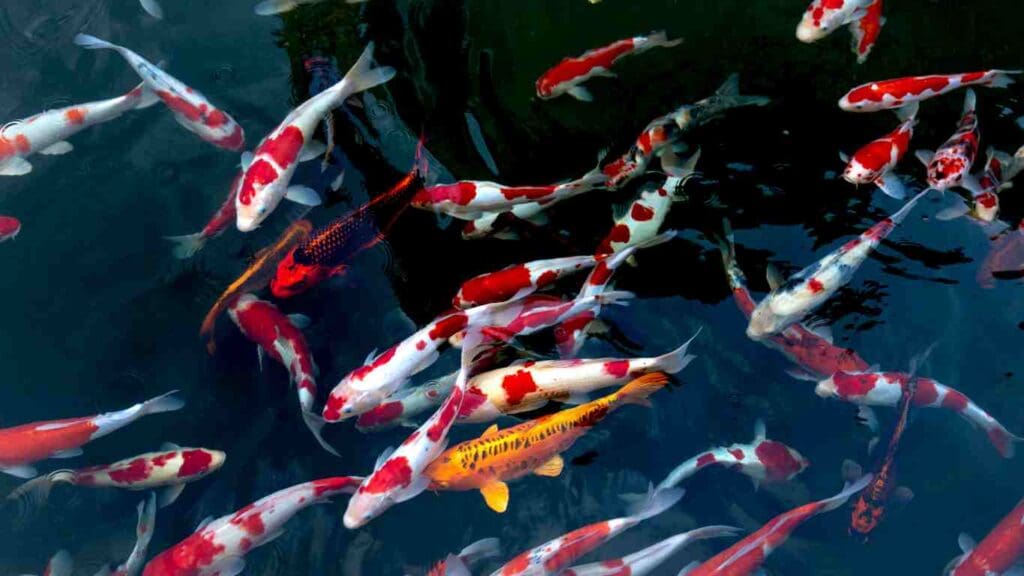

Factors Affecting Koi Fish Population
When it comes to determining the number of koi fish that can be kept in a 100-gallon pond, there are several factors that need to be considered. Here are some of the key factors that can affect the population of koi fish in your pond:
Pond Size and Shape
The size and shape of your pond will play a significant role in determining the number of koi fish that can be kept in it. As a general rule of thumb, you should aim to have at least 250 gallons of water for each koi fish in your pond. This means that a 100-gallon pond can typically only accommodate one or two small koi fish.
Koi Fish Size
The size of your koi fish will also impact the number of fish that can be kept in your pond. Larger koi fish require more space and produce more waste than smaller fish. As a result, you may need to adjust the number of koi fish in your pond based on their size.
Water Quality and Filtration
The quality of your pond water is critical to the health and well-being of your koi fish. Poor water quality can lead to disease and other health problems that can reduce the overall population of fish in your pond. It’s essential to maintain proper filtration and water quality to ensure that your koi fish thrive.
Grech Pond Bio Pressure Filter, UVC Upto 1600 gal, 13W
Feeding Habits
Overfeeding your koi fish can lead to an overpopulation of fish in your pond. This can put a strain on your pond’s filtration system and lead to poor water quality. Be sure to feed your koi fish the appropriate amount of food based on their size and the size of your pond.
Swimming Space
Koi fish need ample swimming space to stay healthy and happy. Overcrowding your pond can lead to stress and health problems in your fish. Be sure to provide enough space for your koi fish to swim and explore their environment.
Overall, there are several factors that can impact the population of koi fish in your 100-gallon pond. By considering these factors and making adjustments as needed, you can create a healthy and thriving environment for your koi fish.


Maintaining a Healthy Koi Pond
Maintaining a healthy koi pond is crucial to ensure the longevity and well-being of your koi fish. Here are some important tips to keep your pond in good condition:
Pond Size
As a general rule, it is recommended to have 1 koi fish for every 250 gallons of water. Therefore, a 100 gallon pond is only suitable for a maximum of 1 small koi fish. Overcrowding can lead to poor water quality, stress, and disease among the fish.
Water Quality
Koi fish require clean and well-oxygenated water to thrive. Here are some ways to maintain good water quality:
- Regularly test the water for pH, ammonia, nitrite, and nitrate levels.
- Install a filtration system to remove debris and waste from the water.
- Add beneficial bacteria to the pond to break down organic matter and reduce ammonia levels.
- Avoid overfeeding the fish, as excess food can lead to poor water quality.


Water Temperature
Koi fish prefer water temperatures between 65-75°F. Fluctuations in temperature can stress the fish and make them more susceptible to disease. Here are some ways to regulate water temperature:
- Install a pond heater to maintain a consistent temperature.
- Provide shade to the pond to prevent overheating during hot weather.
- Avoid placing the pond in direct sunlight or near sources of heat, such as air conditioning units.
Feeding
Koi fish should be fed a balanced diet that meets their nutritional needs. Overfeeding can lead to poor water quality and health problems. Here are some tips for feeding your koi fish:
- Feed the fish once or twice a day, and only as much as they can consume in 5-10 minutes.
- Use a high-quality koi food that contains a balance of protein, carbohydrates, and fats.
- Avoid feeding the fish during colder months when their metabolism slows down.
By following these tips, you can maintain a healthy and thriving koi pond for your fish to enjoy.


Potential Challenges and Solutions
When it comes to keeping koi in a 100-gallon pond, there are a few potential challenges you may face. However, with proper planning and care, these challenges can be overcome.
Challenge: Overcrowding
One of the biggest challenges of keeping koi in a small pond is overcrowding. It’s important to remember that koi can grow quite large, and if you have too many fish in a small space, they can become stressed and unhealthy.
Solution: Limit the Number of Koi
To avoid overcrowding, it’s recommended that you limit the number of koi in your 100-gallon pond. As a general rule, you should have no more than 3-4 small koi in a pond of this size. However, keep in mind that the number of koi you can keep will depend on factors such as the size of the fish, the quality of the water, and the filtration system you have in place.
Challenge: Water Quality
Another challenge of keeping koi in a small pond is maintaining good water quality. In a small pond, it’s easy for the water to become polluted, which can lead to health problems for your fish.
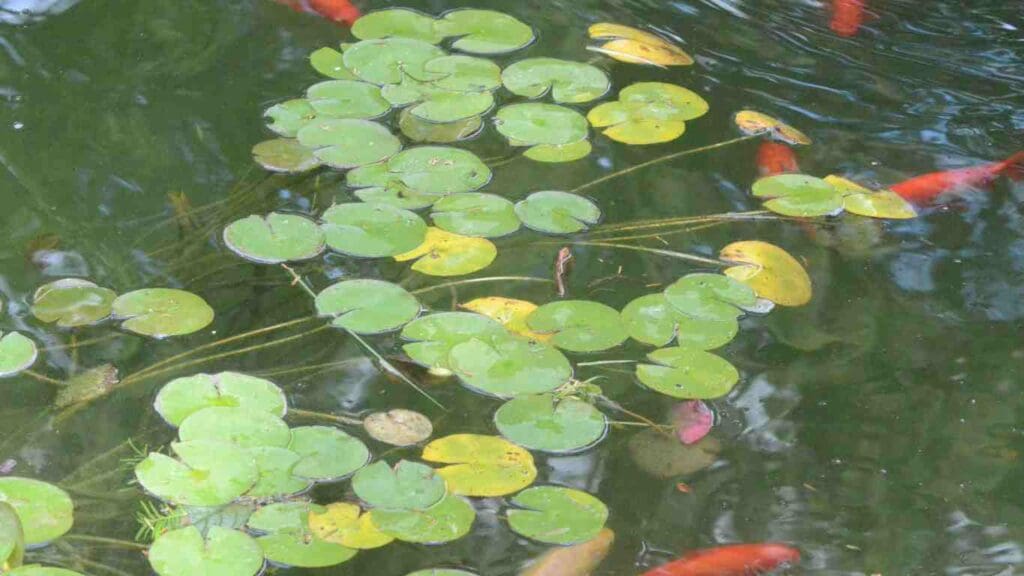

Solution: Proper Filtration and Maintenance
To maintain good water quality, it’s important to have a quality filtration system in place. This can include a mechanical filter to remove debris, a biological filter to promote beneficial bacteria growth, and a UV sterilizer to kill harmful bacteria and parasites. In addition, regular maintenance such as water changes and cleaning the filter will help keep the water clean and healthy for your koi.
Challenge: Feeding
Feeding koi in a small pond can also be a challenge. If you overfeed your fish, it can lead to poor water quality and health problems. On the other hand, if you underfeed them, they may not get the nutrients they need to stay healthy.
Solution: Feed Small Amounts Frequently
To avoid overfeeding, it’s best to feed your koi small amounts frequently throughout the day. This will help prevent excess food from accumulating in the pond and keep the water clean. You can also use a high-quality koi food that is specifically formulated for small ponds to ensure your fish get the nutrients they need.
Overall, while there are some challenges to keeping koi in a 100-gallon pond, with proper planning and care, you can create a healthy and thriving environment for your fish.


Join Us and Get a FREE eBook with Everything You Need to Know to Build Your Koi Pond
Final Remarks
In the end, determining the number of koi fish that can be kept in a 100-gallon pond is not as straightforward as it may seem. While some sources suggest that one koi can be kept in a 100-gallon pond, others recommend a maximum of two or three koi.
It is important to consider various factors such as water quality, filtration, and feeding schedule when determining the maximum number of koi suitable for your pond. As a rule of thumb, a 100-gallon pond can accommodate up to two small koi or one larger koi depending on the conditions.
Remember, overcrowding your pond can lead to poor water quality, stress, and disease among your koi. It is always better to err on the side of caution and keep fewer koi in a smaller pond to ensure their health and well-being.
In addition to the number of koi, it is also important to consider the size of your pond, the type of filtration system, and the feeding schedule to ensure that your koi thrive in their environment. With proper care and attention, your koi can bring joy and beauty to your pond for many years to come.
Frequently Asked Questions
What is the recommended number of koi for a 100-gallon pond?
As a general rule, it is recommended to keep no more than one koi per 250 gallons of water. This means that a 100-gallon pond can comfortably house only one or two small koi. However, it is important to consider factors such as filtration, water quality, and feeding schedule when determining the number of koi suitable for your pond.
How many koi can comfortably live in a 100-gallon pond?
A 100-gallon pond is relatively small, and it is not recommended to overcrowd it with too many fish. Ideally, you should keep no more than two small koi in a 100-gallon pond. Keeping too many koi in a small pond can lead to poor water quality, stress, and disease.
Can you keep koi in a 100-gallon pond?
Yes, you can keep koi in a 100-gallon pond, but you need to ensure that the pond is adequately filtered and maintained to support the fish. It is also important to keep the number of koi in the pond to a minimum to prevent overcrowding.
What is the maximum number of fish that can be kept in a 100-gallon pond?
The maximum number of fish that can be kept in a 100-gallon pond depends on the size and species of the fish, as well as the filtration system and water quality. As a general rule, it is recommended to keep no more than two small koi in a 100-gallon pond.
What is the ideal stocking density for a 100-gallon koi pond?
The ideal stocking density for a 100-gallon koi pond is one or two small koi. Overcrowding the pond can lead to poor water quality and stress, which can make the fish more susceptible to disease.
How many small pond fish can be kept in a 100-gallon pond?
The number of small pond fish that can be kept in a 100-gallon pond depends on the size and species of the fish, as well as the filtration system and water quality. As a general rule, it is recommended to keep no more than two small koi in a 100-gallon pond. If you want to keep other types of fish, such as goldfish or minnows, you should adjust the number accordingly to prevent overcrowding.
 1 (509) 228-8646
1 (509) 228-8646


